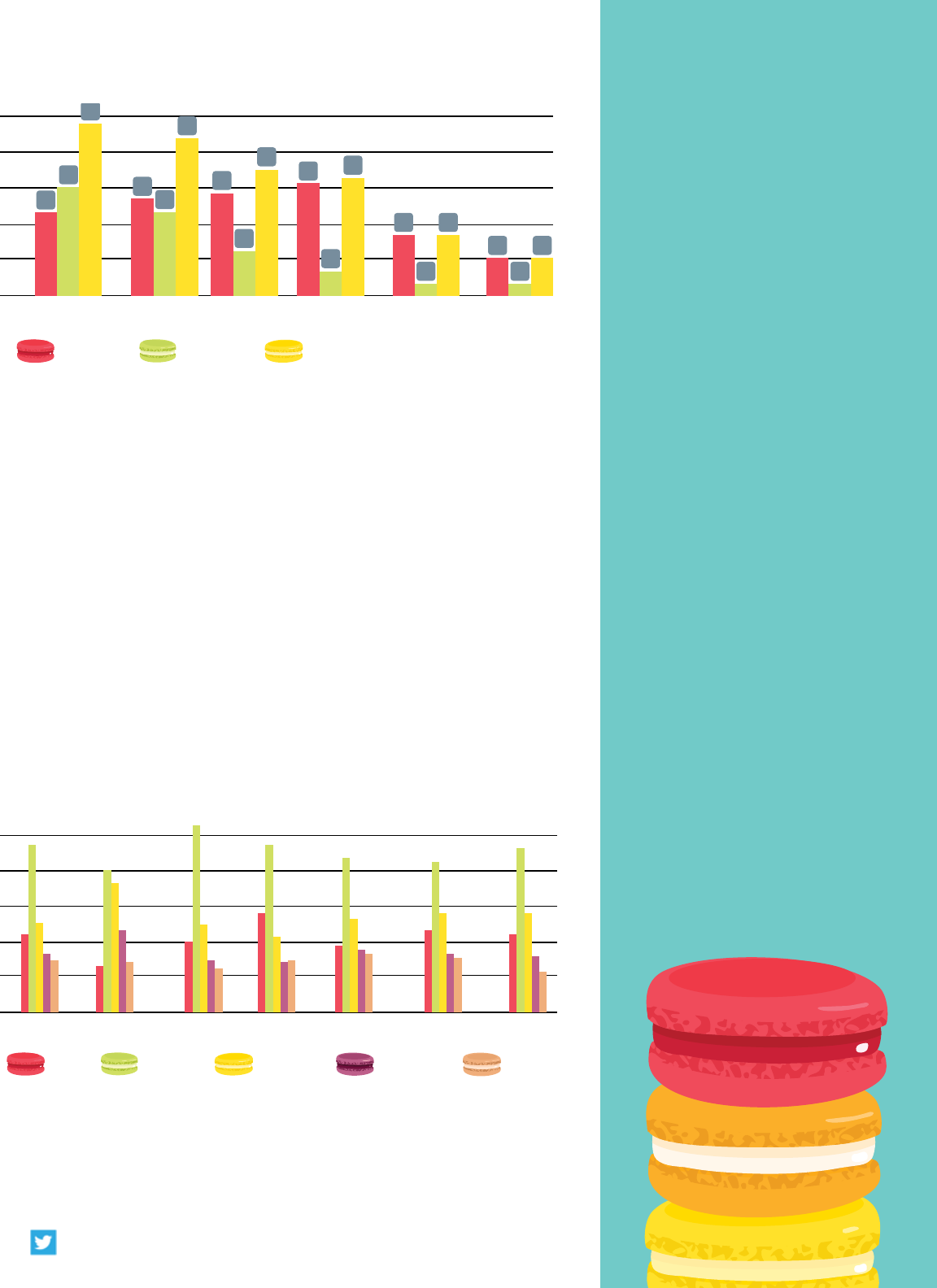
or
Career Sweetener?
sugarcoating
The Market Value of PHR and SPHR Certifications
Research
PayScale
Report

With the job uncertainty of recent years, professionals are
eager to prove themselves a more valuable asset than others
in their field.
Finding ways to set themselves apart from their colleagues is a constant challenge for any professional. Human
resource professionals have the option of attaining the Professional in Human Resources (PHR) and Senior
Professional in Human Resources (SPHR) certifications as a way to do that. The professional distinction of a
certification serves to set experts apart from other HR professionals. Those who get certified not only gain a
valuable education, but also increase their job opportunities and pay. “For the second year we have produced an
in-depth report analyzing the impact of PHR and SPHR certifications on pay and career growth for HR positions.
Once again we found that holding one or both of these certifications is a surefire way to increase pay, as well as
the propensity to be promoted to a higher position,” reports Katie Bardaro, Lead Economist at PayScale.
New research conducted by PayScale quantifies the impact of gaining the certification. The data shows Human
Resources professionals with the PHR and SPHR designations through the career labyrinth faster and make
more money than those who lack the certification. This pattern holds across all industries as well as the largest
metropolitan areas. HR Certification is becoming an important means for employers to recognize HR expertise,
and for HR professionals to sweeten their HR careers.
Research Highlights:
• Fuel for Promotions. Holding either certification is linked to increased frequency and level of promotion.
• Top Heaviness. Certification frequency increases along with job title, with almost 50% of VPs holding either
a PHR or SPHR. As job responsibility increases, so does the likelihood of certification
• SPHR is Trendier for Leaders in 2013. The rates of SPHR certification at the highest career levels
increased from 2012 to 2013.
• SMBs are Getting the HR Talent in 2013. In 2012 certified HR professionals were most likely to work at
large companies. In 2013 that trend flipped, with companies with fewer than 500 employees eclipsing larger
ones.
• Executives Made Less in 2013. HR professionals made more money overall in 2013, unless they
happened to have a seat at the executive table. VPs of HR have lower salaries in 2013 than they did in 2012.
• Certified HR Professionals are Satisfied. Of those certified, 80% reported overall job satisfaction.

Job Progression
Holding a PHR or SPHR certification can be a powerful energy boost
to career momentum. Comparing the rates of promotion for those with
either certification against those who held neither certification proves
professionals with either the PHR or SPHR attain promotion more
frequently and move into higher positions more often than those without
either certification. In fact, in almost every position the chances of
advancement doubles.
Percentage Receiving Promotion Within 5 Years
Frequency of Certifications at Higher
Levels of Management
PayScale’s analysts looked at the certification status for respondents
compared to their current job title. With each turn through the career
labyrinth, the frequency of certification increases. In addition, the
research shows that nearly half of those HR professionals with the
greatest levels of responsibility hold either the PHR or the SPHR.
70
60
50
40
30
20
10
0
HR Director HR Manager HR Generalist HR Administrator HR Assistant
Without Certification With Certification
11%
25%
14%
43%
27%
57%
27%
63%
34%
5%
Of certified hr
assistants got
promoted
of the un-certified
did.
63%
34%

www.payscale.com/hr | US Toll Free: 1.888.699.0702 | Email: [email protected]
Percentage of Those by Title Holding Certifications
Frequency by Company Size
While not a major factor, company size does play a role in whether or
not HR professionals hold a PHR or SPHR certification. PayScale found
that HR professionals with either certification are more likely to work
at small or medium-sized companies than at larger companies. This
is a flip from 2012, when the largest of companies also had the most
likelihood to have certified HR professionals on staff. The decrease
for the largest of companies may be tied to the fact that junior staff
members, which as we saw are less likely to hold a certification, make
up a larger percentage of total staff.
Percentage with Either Certification by
Company size
50
40
30
20
10
0
Vice President, HR HR Director HR Manager HR Generalist HR Administrator HR
Assistant
With PHR With SPHR With Either
19%
19%
25%
21%
23%
26%
28%
11% 11%
7%
2%
5% 5%
0% 0%
42%
39%
30%
50
40
30
20
10
0
All HR Vice President, HR HR Director HR Manager HR Generalist HR Administrator HR Assistant
1-99 100-499 500-1999 2000-9999 10,000+
SPHR is
Trendier for
Leaders in 2013
The percentage
overall of people
holding either cert
stayed the same from
2012 to 2013, but
in 2013 there was
an increase in the
SPHR at manager
level or above from
2012 numbers.
That same group’s
PHR certifications
decreased from 2012
to 2013. The higher
the career level, the
more significant that
swing toward the
SPHR.

www.payscale.com/hr | US Toll Free: 1.888.699.0702 | Email: [email protected]
Pay Differences
HR professionals who hold the PHR or SPHR certifications tend to
make more money than their peers who do not. While the difference
is relatively small at more junior roles, the difference becomes more
significant in more senior positions. The table shows those at the Vice
President level actually make a little less. This is potentially explained
by the declining importance of the certifications at the highest levels,
compared to factors like budget, scale of the enterprise and scale of
staff.
PHR
Median Pay
SPHR
Median Pay
Either Cert
Median Pay
Neither Cert
Median Pay
All HR $59,100 $87,900 $64,700 $45,600
Vice President, HR $125,000 $138,000 $131,000 $140,000
HR Director $77,000 $98,600 $88,000 $76,500
HR Manager $64,000 $74,700 $66,200 $54,500
HR Generalist $50,900 $56,200 $51,200 $44,800
HR Administrator $44,800 N/A $44,800 $39,500
HR Assistant $35,500 N/A $35,500 $32,500
By Location
Wherever the zip code, the PHR and SPHR certifications go along with
higher pay for those that hold them. PayScale looked at the ten largest
metros in the country and found that HR folks with certifications have a
higher median pay than those without. The median annual pay numbers
listed here included HR professionals at all levels of experience, working
in companies of all sizes.
No Sugar at
the Exec. Table
With or without a
certification, HR
professionals overall
made slightly more
money in 2013 than
they did in 2012,
however those
increases weren’t
seen at the executive
table. HR Vice
Presidents in every
category made less
money than they did
in 2012.

MSA Size
Rank
Metropolitan
Statistical Area
All HR
(either cert)
All HR
(neither cert)
% Increase
with Cert
1
New York $75,900 $55,400 37%
2
Los Angeles $66,000 $50,100 32%
3
Chicago $67,100 $47,800 40%
4
Dallas $70,500 $47,900 47%
5
Philadelphia $66,800 $51,500 30%
6
Houston $66,400 $46,100 45%
7
Washington DC $77,400 $53,700 44%
8
Miami $65,400 $45,900 42%
9
Atlanta $70,900 $45,900 54%
10
Boston $76,300 $54,300 41%
by industry
Although pay varies across industries, PHR and SPHR holders nearly
always make more money than those with neither cetification.
Industry
All HR
(either cert)
All HR
(neither cert)
Accommodation and Food Services $64,200 $43,900
Construction $61,500 $46,400
Finance and Insurance $61,600 $48,800
Healthcare and Social Assistance $52,700 $40,700
Information Technology $64,300 $51,000
Manufacturing $59,000 $47,300
Non-Profit Organizations $58,800 $43,400
Professional, Scientific and Technical Services $63,000 $50,800
Retail $58,000 $43,000
Wholesale Trade $63,600 $48,100
View the
interactive map

www.payscale.com/hr | US Toll Free: 1.888.699.0702 | Email: [email protected]
By Gender
While pay is fairly even for Assistant, Administrator and Generalist titles,
men tend to earn more when they are Managers, Directors or VPs.
When looking at Gender differences it’s important to look at the fact that
title and certification status are only a small subset of factors that affect
the compensation of HR professionals. When controlled for some of
the 250 other compensable factors PayScale tracks—such as location,
company size, organization type, signing authority, years of experience,
degree and industry—the gender pay differential is much less significant
across all job titles. With all the details that matter taken into account,
the gender difference is generally less than 5%.
Size of Organization
People Managed
Performance Rating
Degree
Years in Field
School
Work Environment
Specialized Skills
Certications
Job Title
Vacation Time
Benets
Volunteer Work
Commute Time
Men
All HR
(either cert)
Women
All HR
(either cert)
% Difference
Vice President, HR $153,000 $119,000 -22%
HR Director $95,600 $82,500 -14%
HR Manager $71,300 $65,400 -8%
HR Generalist $52,200 $51,900 -1%
HR Administrator $48,300 $45,100 -7%
HR Assistant $36,200 $37,100 +2%
All HR $76,700 $63,100 -17%
Soft Job
Features
of certified HR
professionals report
job satisfaction.
have flexible
schedules.
80%
79%

www.payscale.com/hr | US Toll Free: 1.888.699.0702 | Email: [email protected]
The Bottom Line
PayScale reviewed the impact of the PHR and SPHR certifications on the careers of HR professionals and found
that acquiring the certification sweetened the careers of most HR positions. Either certification led to faster career
growth and higher median pay. The positive impact of the credentials could be seen across job titles, industries,
genders and geographies.
Methodology
Using its database of more than 40 million salary profiles and 250 compensable factors, PayScale analyzed
various aspects of Human Resources (HR) positions, comparing results for professionals with and without a
Professional Human Resources (PHR) or Senior Professional in Human Resources (SPHR) certification.
Limiting its research to data from March 2012 to March 2013, PayScale determined how HR positions for those
holding a PHR or SPHR designation differ from those without either certification in terms of pay levels nationally,
across 10 industries and the 10 largest metropolitan areas and by gender. Additionally, PayScale provided further
analysis comparing company sizes and career progression.
Definitions
Total Cash Compensation (TCC): TCC combines base annual salary or hourly wage, bonuses, profit
sharing, tips, commissions, and other forms of cash earnings, as applicable. It does not include equity (stock)
compensation, cash value of retirement benefits, or value of other non-cash benefits (e.g., healthcare).
Median Annual Pay with PHR/SPHR: This is the median, annual total cash compensation (TCC) for a person
with the specified HR job title, holding the Professional in Human Resources or Senior Professional in Human
Resources certification.
% Pay Increase for PHR/SPHR Holders: This is the percentage increase in median, annual pay for those with a
PHR/SPHR over those without.
Median Pay Calculations: There were no restrictions on company size, experience level, or other job
qualifications when calculating the median pay figures. All pay figures are in 2013 dollars.
Job Title 5 Years Ago: In PayScale’s survey, users are asked what their job title was five years ago. This data
was used to calculate the ratio of HR professionals whose job title five years ago was a lower level title than their
current title for those with and without the PHR and SPHR.
All HR Job Titles: This group of jobs includes Human Resources (HR) Assistant, HR Administrator, HR
Generalist, HR Manager, HR Director and Vice President, HR.

www.payscale.com/hr | US Toll Free: 1.888.699.0702 | Email: [email protected]
About PayScale
Creator of the largest database of individual compensation profiles in the world containing 40 million salary
profiles, PayScale, Inc. provides an immediate and precise snapshot of current market salaries to employees and
employers through its online tools and software. PayScale’s products are powered by innovative search and query
algorithms that dynamically acquire, analyze and aggregate compensation information for millions of individuals in
real time. Publisher of the quarterly PayScale Index™, PayScale’s subscription software products for employers
include PayScale MarketRate™, PayScale Insight™, and PayScale Insight Expert™. Among PayScale’s 2,500
corporate customers are organizations small and large across industries including Mozilla, Tully’s Coffee, Clemson
University and the United States Postal Service.
Learn more about PayScale’s data methodology here: http://www.payscale.com/hr/product-how-it-works
See the infographic: http://www.payscale.com/hr/2013-compensation-practices-infographic
To see pay trends for HR certifications in other markets; view a
customized PayScale Index Report. Get yours at
http://resources.payscale.com/hr-us-compensation-trends.html
